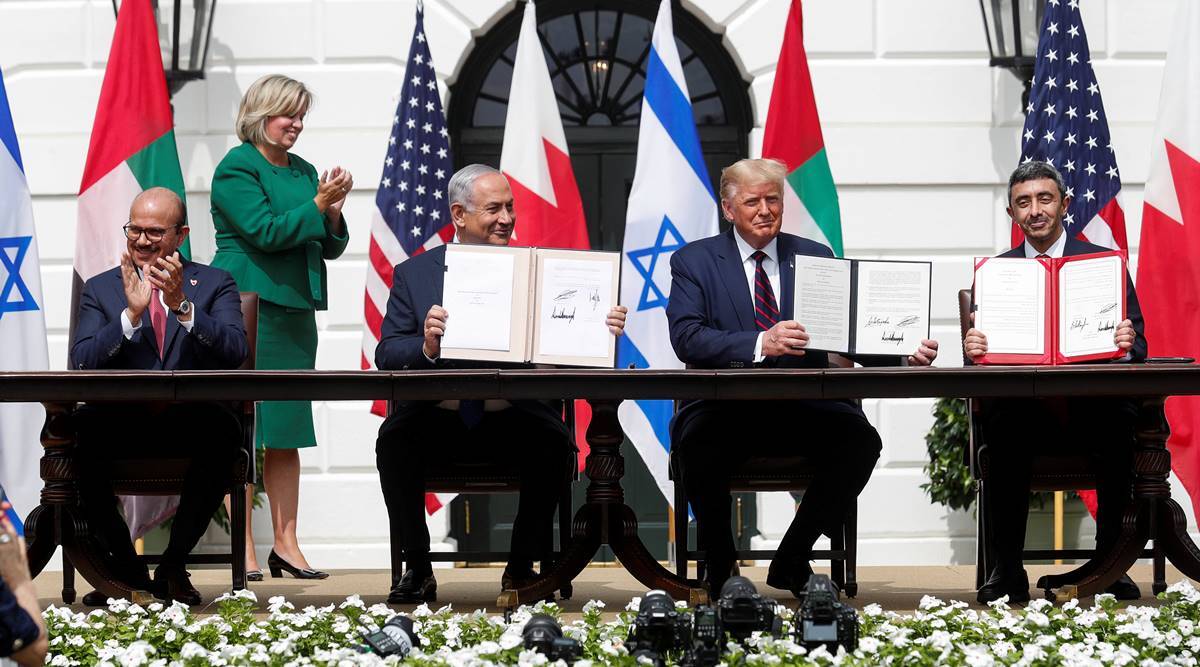 Bahrain’s Foreign Minister Abdullatif Al Zayani, Israel's Prime Minister Benjamin Netanyahu, U.S. President Donald Trump and United Arab Emirates (UAE) Foreign Minister Abdullah bin Zayed participate in the signing of the Abraham Accords, normalizing relations between Israel and some of its Middle East neighbors on the South Lawn of the White House (REUTERS/Tom Brenner)
Bahrain’s Foreign Minister Abdullatif Al Zayani, Israel's Prime Minister Benjamin Netanyahu, U.S. President Donald Trump and United Arab Emirates (UAE) Foreign Minister Abdullah bin Zayed participate in the signing of the Abraham Accords, normalizing relations between Israel and some of its Middle East neighbors on the South Lawn of the White House (REUTERS/Tom Brenner)On September 15, two years ago, Israel, the United Arab Emirates and Bahrain signed the United States-brokered Abraham Accords. It was a historic moment for our peoples and nations, fostering new hope for peace and prosperity in the Middle East. It also brought exciting opportunities for India and its thriving business community, which enjoys strong relations and engagement with our countries.
The Abraham Accords were a product of collaboration between our nations towards normalisation of ties, bringing Israel closer to the Gulf nations that shared common values and mutual interests, and taking forward the peace initiative.
As we mark the second anniversary of the signing of the Abraham Accords, the benefits of this peace continue to grow. Increasingly, we are seeing deepening people-to-people ties and business opportunities. New joint ventures are being undertaken in critical sectors such as clean energy, health, innovation, technology, agriculture, water, trade, tourism, sustainability and much more.
We have also worked to produce academic collaborations between our universities, promote cultural exchange in the arts field, and raise awareness about our shared histories and heritage. Ultimately, we aim to further strengthen our mutual understanding and the close friendship between our people.
Moreover, the launch of direct flights has increased connectivity between our nations to facilitate the movement of tourists, business people and students. People are eager to explore new places, learn about local cultures and forge new friendships to last a lifetime.
The boost to regional connectivity has also benefited the people of India. The thriving Indian diaspora throughout the Gulf can now fly directly from the UAE to Israel or from Israel to Bahrain. Indian students are travelling back and forth, obtaining easier access to our universities, and exploring international study programmes.
The Accords have paved the way for greater regional and multinational cooperation. Expanding economic opportunities continue to reach India, and we have already seen major commercial collaborations between companies from the UAE, Israel, Bahrain and the United States with the Indian private sector.
One concrete example of high-level economic cooperation between our governments is the formation of the I2U2 Group, established by Israel, India, the UAE, and the United States. First made possible by the Abraham Accords, the I2U2 Group will focus on joint investments in water, energy, transportation, space, health, and food security.
Through two key projects in India, I2U2 partners will mobilise private sector capital and expertise to help modernise infrastructure, decarbonise industries, improve public health, and promote the development of green technologies.
In turn, these projects will also greatly benefit the people of India. I2U2 combines the strengths and resources of each member country to find innovative solutions to pressing global challenges and will serve as a model for multilateral cooperation with other like-minded countries.
India is one of our important partners, and the breadth of our cooperation reflects our mutual interests: Championing a sustainable recovery from the Covid-19 pandemic, expanding trade, addressing climate change, and combating threats to international security and stability.
In collaboration with the public and private sectors of our countries, we can deliver promising results for the entire world.
Our countries, which share a special bond with India and its people, are committed to exploring the full potential of the Accords as partners in peace and prosperity. Achieving our shared vision is a responsibility for the youth in particular throughout our region and beyond. In efforts to build upon the success of the Accords, United States, Israel, the UAE, and Bahrain — alongside India — will continue to prioritise the greatest benefit to our people and ensure lasting impact for generations to come.
Ahmed Abdul Rahman Albanna is Ambassador of the UAE to India, Abdulrahman Mohammed Al-Gaoud is Ambassador of the Kingdom of Bahrain to India, Naor Gilon is Ambassador of Israel to India and Patricia A. Lacina is Chargé d’Affaires of the US Mission to India